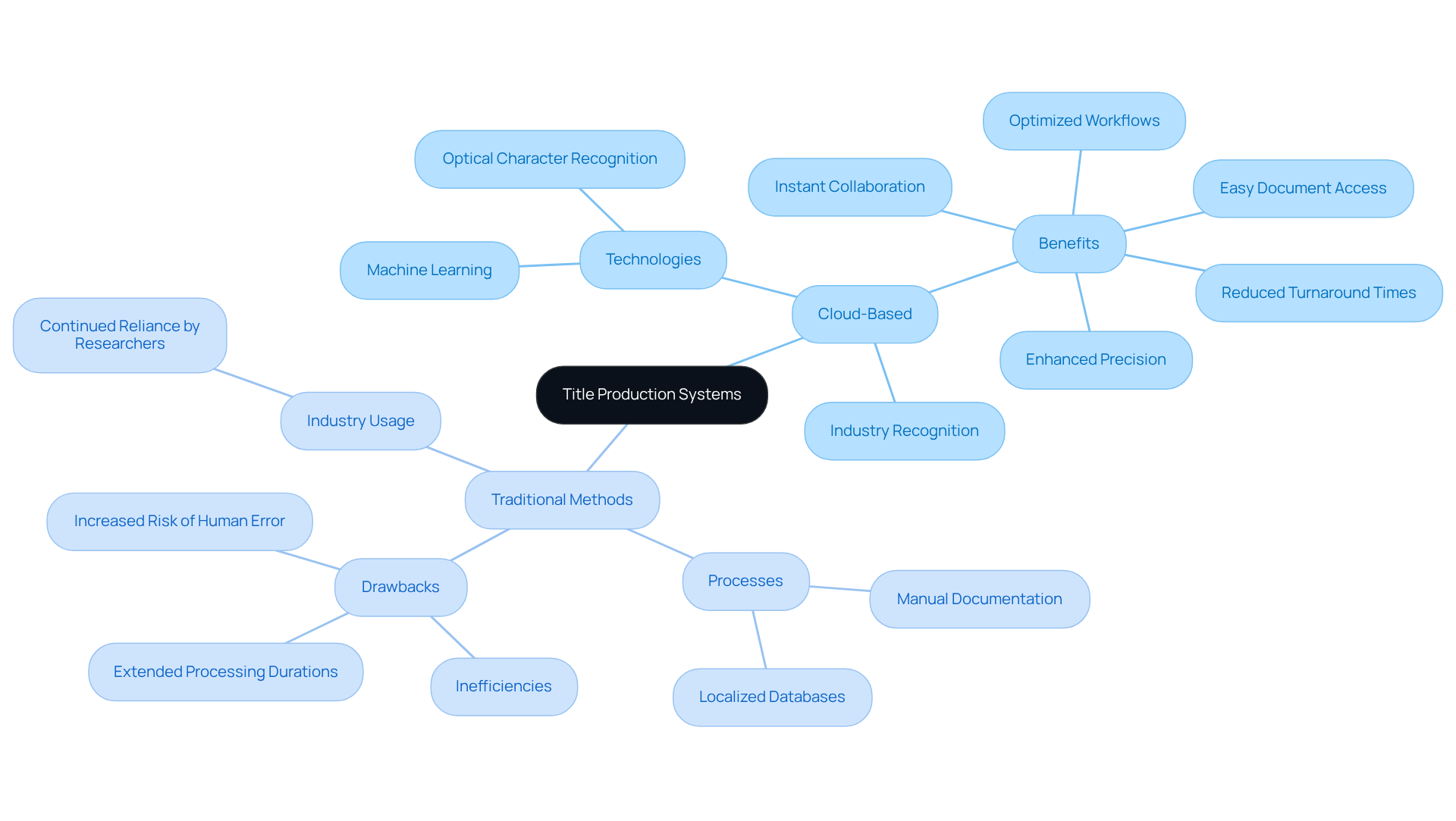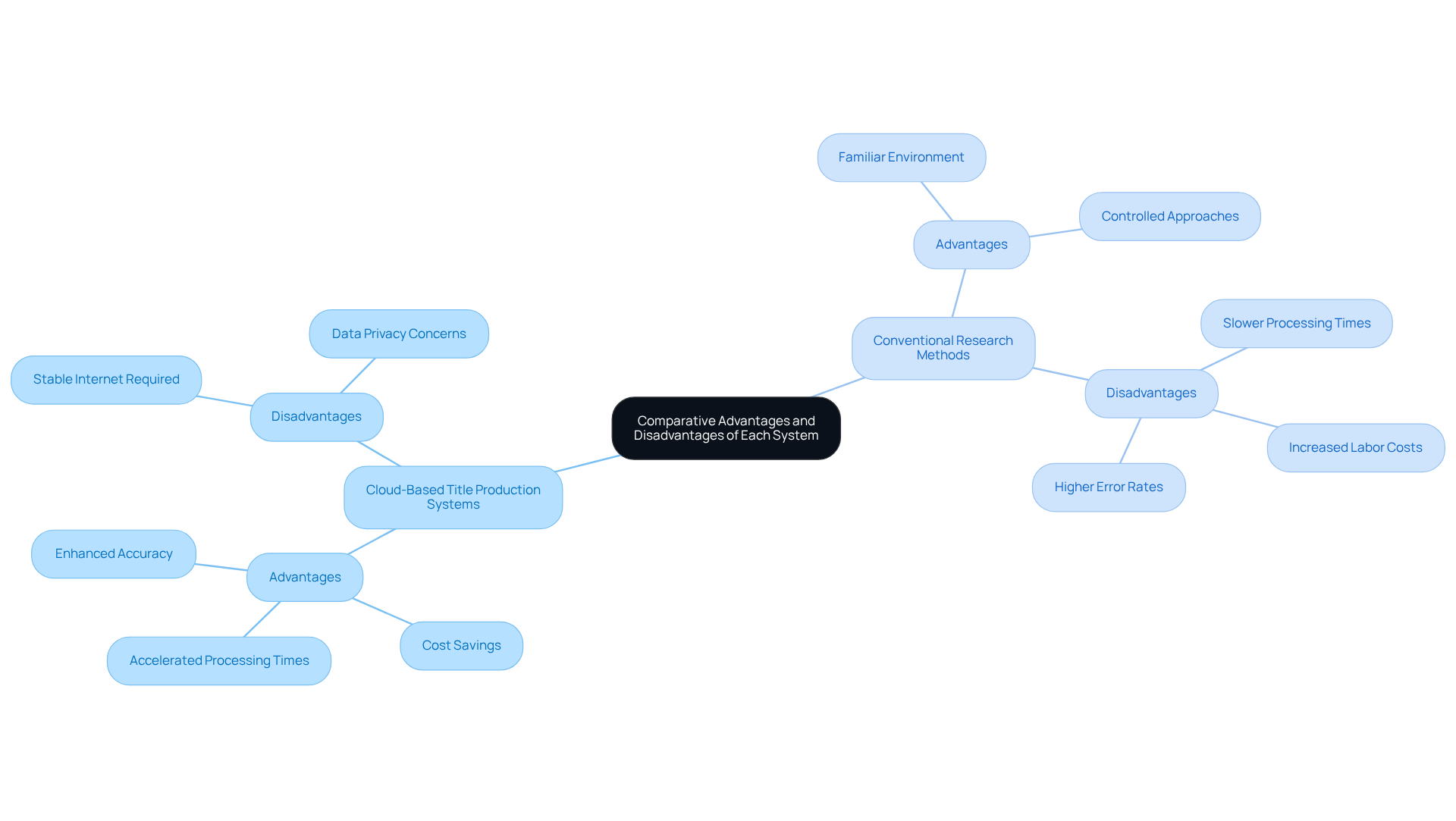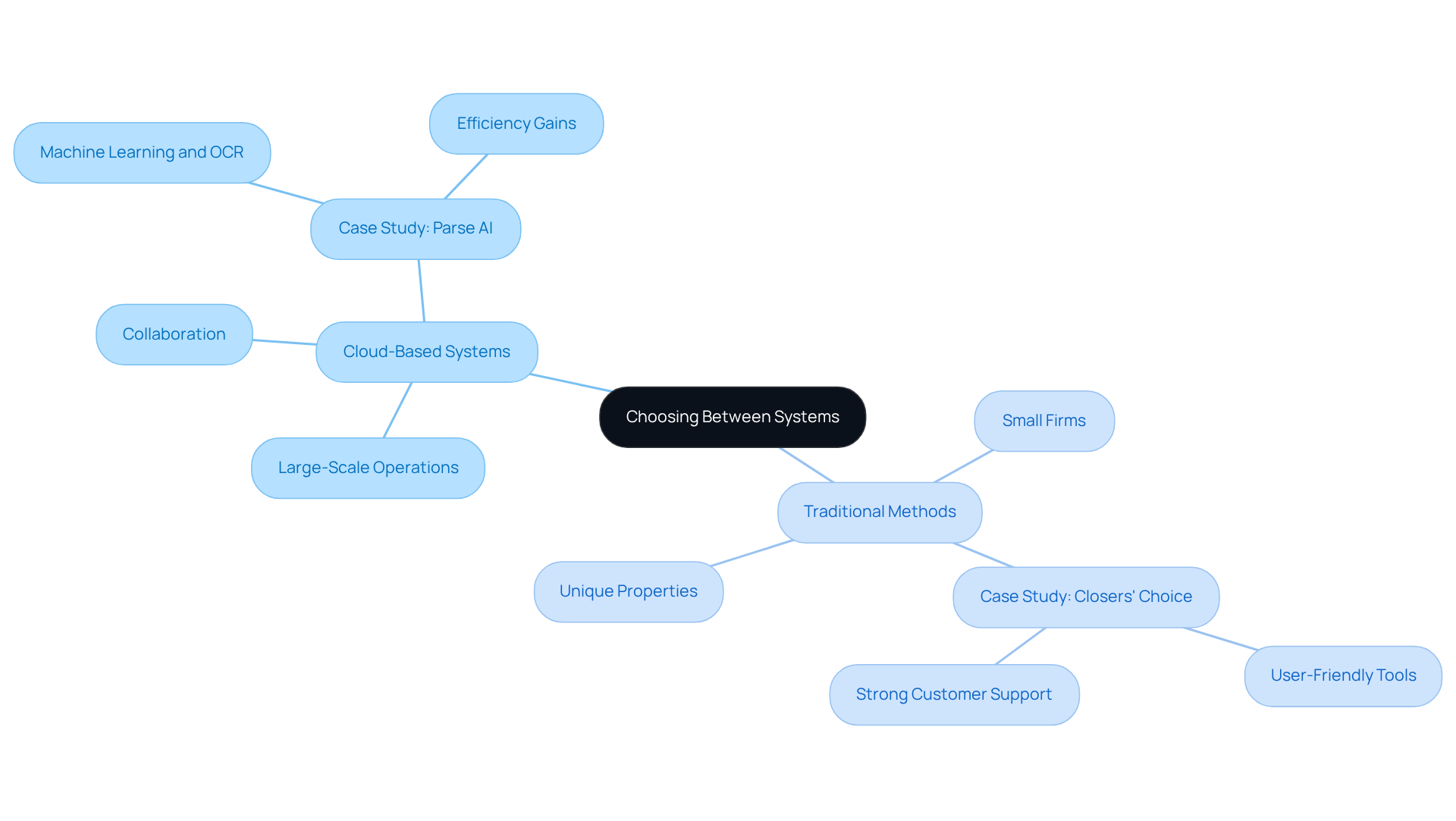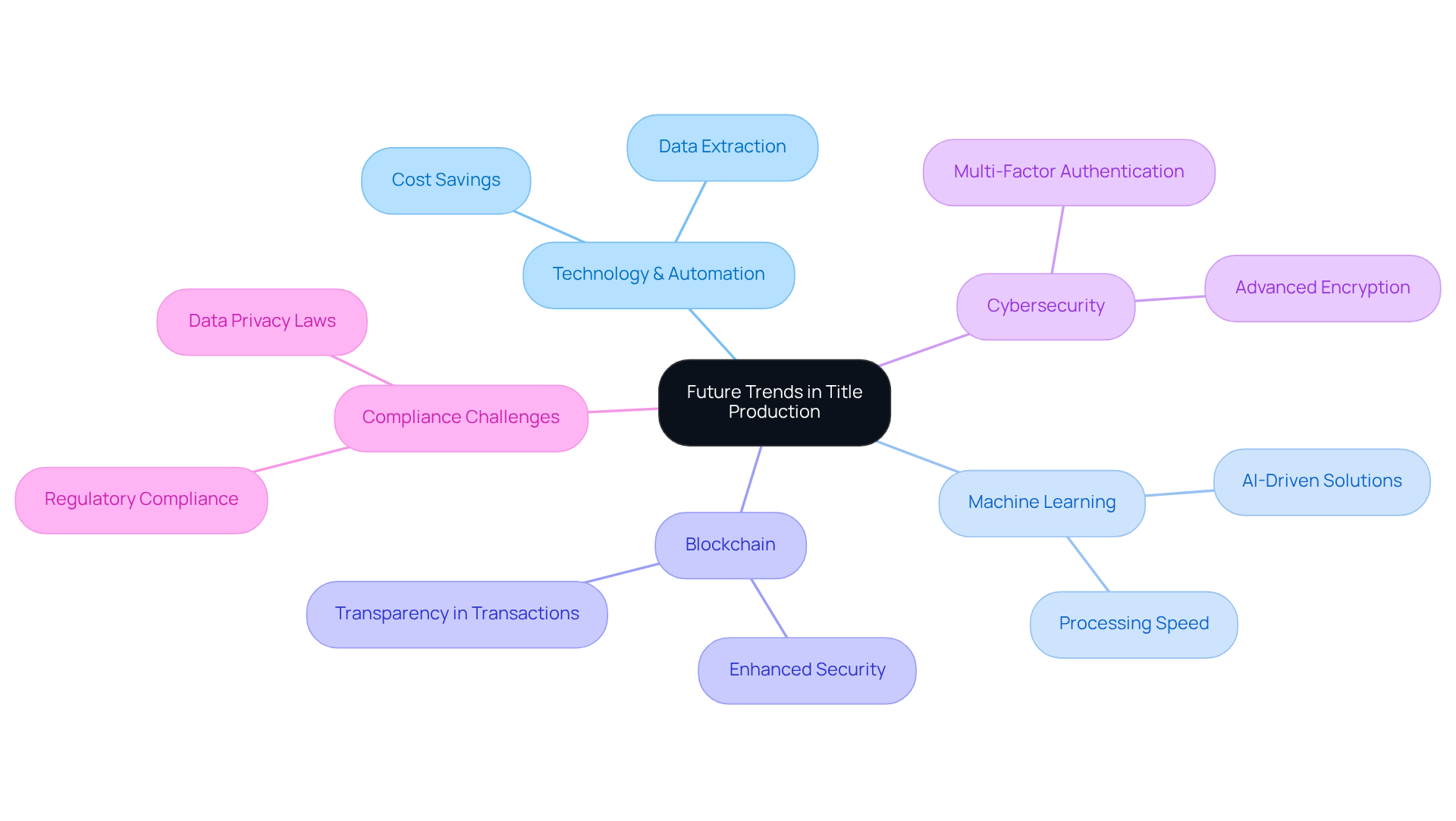Overview
Cloud-based title production systems present considerable advantages over traditional methods, such as:
- Expedited processing times
- Cost efficiency
- Improved accuracy achieved through automation and advanced technologies
Notably, while cloud systems are particularly suited for large-scale operations due to their inherent efficiency, traditional methods may still be favored for smaller, more personalized needs. This observation underscores the critical importance of evaluating specific operational requirements when selecting between these two approaches.
Introduction
The landscape of title production is undergoing a profound transformation, as technological advancements challenge the status quo of traditional methods. Cloud-based title production systems are emerging as a powerful alternative, offering enhanced efficiency and accuracy through automation and real-time collaboration. However, the reliance on established practices raises a critical question: can traditional methods keep pace with the evolving demands of the industry, or will they become obsolete in the face of innovation? Exploring the strengths and weaknesses of both approaches reveals essential insights for real estate professionals navigating this pivotal shift.
Defining Cloud-Based Title Production Systems and Traditional Methods
Cloud-based title production systems leverage advanced technologies, including machine learning and optical character recognition, to efficiently manage and process ownership documents. These platforms facilitate instant collaboration, provide easy access to documents, and optimize workflows, significantly enhancing precision and reducing turnaround times.
In contrast, traditional examination techniques often rely on manual processes, extensive physical documentation, and localized databases. This dependence can result in inefficiencies, extended processing durations, and an increased risk of human error. Notably, a significant number of researchers in the field continue to utilize conventional methods, which may hinder their ability to adapt to rapidly changing market demands.
Industry leaders recognize that the shift to cloud-based title production systems represents a pivotal transformation in production, highlighting the urgent need for modernization to improve operational efficiency. As the landscape evolves, understanding these distinctions is crucial for evaluating the strengths and weaknesses of each approach in ownership research.

Comparative Advantages and Disadvantages of Each System
Cloud-based title production systems offer substantial advantages, including:
- Accelerated processing times attributed to automation
- Cost savings through optimized resource management
- Enhanced accuracy facilitated by advanced data extraction technologies
However, these systems rely on a stable internet connection and may raise concerns regarding data privacy and security.
In contrast, conventional research methods offer a familiar and controlled environment, appealing to professionals who favor hands-on approaches. Nevertheless, they are frequently marked by:
- Slower processing times
- Increased labor costs
- A higher incidence of errors resulting from manual handling
Data indicates that error rates in conventional research can be significantly higher than those in cloud-based title production systems, which utilize machine learning to minimize inaccuracies.
Real estate experts have noted that transitioning to cloud-based title production systems can yield substantial cost reductions, with some reporting decreases in operational expenses by as much as 30%.
This comparative analysis underscores the necessity for real estate professionals to thoroughly evaluate these factors when selecting a production method, weighing the benefits of innovation against the reliability of established practices.

Use Cases: When to Choose Cloud-Based Systems vs. Traditional Methods
Cloud-based title production systems excel in large-scale operations or firms handling high transaction volumes, as they enhance collaboration among team members and streamline processing times. A real estate firm overseeing multiple properties across various regions can leverage cloud solutions to maintain operational efficiency and consistency. In contrast, conventional methods may be more suitable for smaller firms or those handling unique or complex properties that require a personalized approach. The familiarity and control provided by traditional methods can often outweigh the advantages of automation in these scenarios.
Case studies demonstrate this dynamic:
- Closers' Choice, an easy-to-use platform, is preferred by small to medium-sized agencies for its straightforward tools and robust customer support.
- Parse AI illustrates how cloud-based title production systems can significantly enhance efficiency for document researchers by employing machine learning and optical character recognition to accelerate the extraction of information from documents.
This duality highlights the importance of assessing specific operational needs when deciding between cloud-based title production systems and traditional methods.

Future Trends in Title Production: The Impact of Technology and Automation
The production landscape is on the brink of a significant transformation, primarily driven by advancements in technology and automation. Machine learning and artificial intelligence are set to revolutionize data extraction and analysis, significantly reducing both the duration and costs associated with research. For instance, Parse AI's innovative platform utilizes machine learning and optical character recognition to expedite the processing of document titles, enabling researchers to complete abstracts and reports with remarkable speed and precision. This efficiency results in substantial cost savings, with reports indicating that AI-driven solutions can cut processing time by up to 70% compared to traditional methods.
Furthermore, the integration of blockchain technology is anticipated to enhance transparency and security in property transactions, further streamlining the verification process. However, as cyber threats targeting property firms become increasingly sophisticated, robust cybersecurity measures, including advanced encryption and multi-factor authentication, will be essential to safeguard sensitive information. By 2025, title companies will encounter significant challenges, including regulatory compliance and the imperative to adapt to evolving data privacy laws, making these measures even more critical.
Real estate professionals must remain vigilant and informed about these emerging trends to effectively leverage new tools and methodologies. By embracing these technological advancements, they can enhance their operations, improve customer service, and maintain a competitive edge in an evolving market landscape.

Conclusion
The exploration of cloud-based title production systems versus traditional methods reveals a transformative shift in the management and processing of ownership documents. The advantages of cloud technology—enhanced efficiency, accuracy, and cost-effectiveness—stand in stark contrast to the limitations of conventional approaches, which often rely on cumbersome manual processes. As the industry evolves, recognizing the importance of this transition is vital for real estate professionals seeking to modernize their operations.
Key insights from the analysis highlight that cloud-based systems excel in large-scale operations, offering rapid processing and improved collaboration. In contrast, traditional methods may still hold value for smaller firms that require a personalized touch. The comparative advantages and disadvantages outlined in the article underscore the necessity for professionals to carefully assess their specific needs when choosing between these two approaches. Furthermore, anticipated advancements in technology and automation signal a future where cloud solutions will likely dominate, driven by innovations such as machine learning and blockchain.
Ultimately, embracing these emerging technologies is essential for real estate professionals aiming to enhance their operational efficiency and competitiveness. The evolving landscape of title production presents both challenges and opportunities, making it imperative to remain informed and adaptable. By leveraging the benefits of cloud-based systems, professionals can improve their processes and better serve their clients in an increasingly dynamic market.
Frequently Asked Questions
What are cloud-based title production systems?
Cloud-based title production systems utilize advanced technologies like machine learning and optical character recognition to efficiently manage and process ownership documents, enabling instant collaboration and easy access to documents.
How do cloud-based systems improve workflow?
These systems optimize workflows by enhancing precision and significantly reducing turnaround times in the processing of ownership documents.
What are the main characteristics of traditional title examination methods?
Traditional methods rely on manual processes, extensive physical documentation, and localized databases, which can lead to inefficiencies, longer processing times, and a higher risk of human error.
Why do some researchers continue to use traditional methods?
A significant number of researchers still use conventional methods, which may limit their ability to adapt to rapidly changing market demands.
What is the industry perspective on the shift to cloud-based systems?
Industry leaders view the transition to cloud-based title production systems as a crucial transformation that underscores the need for modernization to enhance operational efficiency.
Why is it important to understand the differences between cloud-based and traditional methods?
Understanding these distinctions is essential for evaluating the strengths and weaknesses of each approach in ownership research, especially as the industry evolves.




